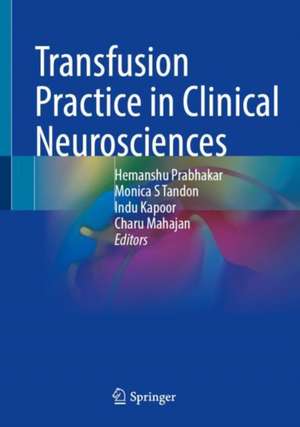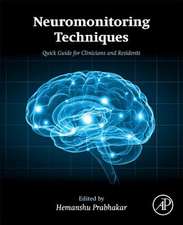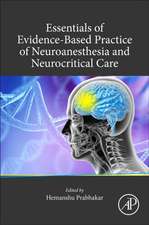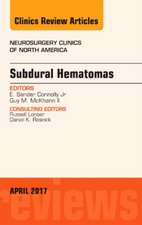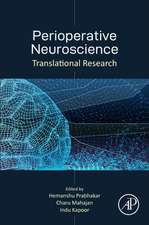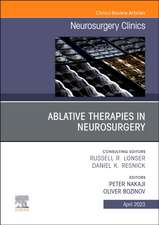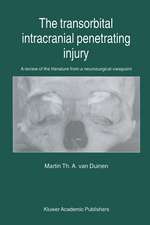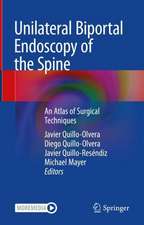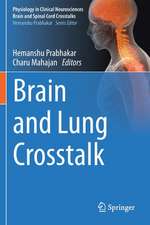Transfusion Practice in Clinical Neurosciences
Editat de Hemanshu Prabhakar, Monica S Tandon, Indu Kapoor, Charu Mahajanen Limba Engleză Hardback – 17 iun 2022
| Toate formatele și edițiile | Preț | Express |
|---|---|---|
| Paperback (1) | 967.88 lei 38-44 zile | |
| Springer Nature Singapore – 18 iun 2023 | 967.88 lei 38-44 zile | |
| Hardback (1) | 1451.01 lei 3-5 săpt. | |
| Springer Nature Singapore – 17 iun 2022 | 1451.01 lei 3-5 săpt. |
Preț: 1451.01 lei
Preț vechi: 1527.37 lei
-5% Nou
Puncte Express: 2177
Preț estimativ în valută:
277.64€ • 290.67$ • 229.74£
277.64€ • 290.67$ • 229.74£
Carte disponibilă
Livrare economică 15-29 martie
Preluare comenzi: 021 569.72.76
Specificații
ISBN-13: 9789811909535
ISBN-10: 9811909539
Pagini: 600
Ilustrații: XVI, 600 p. 40 illus., 35 illus. in color.
Dimensiuni: 178 x 254 mm
Greutate: 1.44 kg
Ediția:1st ed. 2022
Editura: Springer Nature Singapore
Colecția Springer
Locul publicării:Singapore, Singapore
ISBN-10: 9811909539
Pagini: 600
Ilustrații: XVI, 600 p. 40 illus., 35 illus. in color.
Dimensiuni: 178 x 254 mm
Greutate: 1.44 kg
Ediția:1st ed. 2022
Editura: Springer Nature Singapore
Colecția Springer
Locul publicării:Singapore, Singapore
Cuprins
Part 1 Fluids: Basic consideration
Chapter 1 Body and brain fluid and volume kinetics
Chapter 2 Basics of perioperative fluid requirements in neurosurgical patients
Part 2 Fluids: Types of fluids
Chapter 3 Crystalloids
Chapter 4 Colloids
Chapter 5 Hyperosmolar fluids
Chapter 6 Balanced fluids
Part 3 Fluids: Monitoring fluids
Chapter 7 Invasive versus non-invasive haemodynamic monitoring
Chapter 8 Goal-Directed Fluid Therapy
Part 4 Fluids: Special considerations
Chapter 9 Perioperative Fluid Management for the Neurocritically Ill Patient
Chapter 10 Fluid Management in Pediatric Neurosurgery
Chapter 11 Fluid management in geriatric neurosurgery
Chapter 12 Fluid management in pituitary surgery
Chapter 13 Fluid management in aneurysmal Subarachnoid hemorrhage
Chapter 14 Fluid Management in Traumatic Brain Injury
Chapter 15 Fluid management in spine surgery
Chapter 16 Fluid management in neurosurgical patients with coexisting cardiac diseases
Chapter 17 Fluid management in neurosurgical patients with coexisting pulmonary problems
Chapter 18 Fluid Management In Neurosurgical Patients With Coexisting Renal Problems
Chapter 19 Fluid management in neurointensive care
Chapter 20 Fluid management in sepsis
Part 5 Fluids: Complications
Chapter 21 Acid-base imbalance
Chapter 22 Coagulation abnormalities
Chapter 23 Adverse effects of fluid administration
Part 6 Blood and blood products: Basic consideration
Chapter 24 Composition of Blood
Chapter 25 The Coagulation Cascade
Part 7 Blood and blood products: Blood and components
Chapter 26 Whole blood and Packed RBCs
Chapter 27 Fresh Frozen Plasma
Chapter 28 Platelet rich concentrates
Chapter 29 Cryoprecipitate
Chapter 30 Clotting factor concentrates
Chapter 31 The Use of Activated Recombinant Factor VII in Neurosurgery
Part 8 Blood and blood products: Anticoagulants
Chapter 32 Anticoagulants in Use
Chapter 33 Other Antithrombotics: Antiplatelets and Fibrinolytics
Chapter 34 Antithrombotic reversal agents
Part 9 Blood and blood products: General considerations
Chapter 35 Perioperative assessment of hemorrhagic risk
Chapter 36 Blood Salvage Techniques
Chapter 37 Blood loss estimation techniques
Chapter 38 Monitoring Anticoagulation
Chapter 39 Adjunct therapies to minimize blood loss
Part 10 Blood and blood products: Special considerations
Chapter 40 Management of Patients on Anticoagulants and Antiplatelets in Neurosurgery
Chapter 41 Massive blood loss in neurosurgery
Chapter 42 Blood Transfusion in Patients with Acute Traumatic Brain Injury
Chapter 43 Transfusion Practice in a Jehovah Witness
Chapter 44 Transfusion practice in patients with hereditary and acquired coagulation disorders
Chapter 45 Blood Transfusion practices in Sepsis
Part 11 Blood and blood products: Complications
Chapter 46 Neurological complications of the anticoagulation
Chapter 47 Complications related to blood products
Part 12 Total parenteral nutrition
Chapter 48 Basics of Total Parenteral Nutrition
Chapter 49 Monitoring and complications of total parenteral nutrition
Chapter 50 Special neurologic patient population and TPN.
Notă biografică
Dr Hemanshu Prabhakar is a Professor at the Department of Neuroanaesthesiology and Critical Care at All India Institute of Medical Sciences (AIIMS), New Delhi, India. He received his training in neuroanesthesia and completed his PhD in the same institute. He is the first Indian to be awarded the degree of PhD in the country. He is a recipient of the AIIMS Excellence Award for his notable contribution to academia and has published over 250 papers in peer-reviewed national and international journals. Dr. Prabhakar is a reviewer for various national and international journals, and is also a review author for the Cochrane Collaboration. He has a special interest in evidence-based practice of neuroanesthesia. Dr. Prabhakar is a member of various national and international neuroanesthesia societies and is past secretary of the Indian Society of Neuroanesthesia and Critical Care. He is an invited scholar for various national and international conferences. He is on the editorial board of the Indian Journal of Palliative Care and is the past executive editor of the Journal of Neuroanaesthesiology and Critical Care. He is the first Indian to publish international books in the speciality of neuroanesthesia. He is featured in the Limca Book of Records as a prolific writer in the field of neuroanaesthesiology. The honorary fellowship by the Society of Neurocritical Care (SNCC) has been conferred upon him.
Dr Monica S Tandon is currently a Director Professor in the Department of Anesthesthesiology and Intensive Care (Neuroanesthesia division) at G.B.Pant Institute of Postgraduate Medical Education and Research(GIPMER), New Delhi, India. She received her training in Neuro-anesthesia and Neurocritical Care at the same institute and has over twenty years of experience in the subject. She has numerous publications in national and international journals, and has written chapters in several books on Neuroanesthesia and Neurointensive care. She is also a Section Editor for the Journal of Neuroanesthesiology and Critical Care. Besides being a member of several national, scientific societies, she has served on the Executive committee of the Indian Society of Neuroanesthesiology and Critical Care. She has a keen interest in mentoring students, and has delivered talks on a wide array of neuroanesthesia topics, as an invited faculty at numerous national and international conferences.
Dr Indu Kapoor is an Additional Professor in the Department of Neuroanaesthesiology and Critical Care at All India Institute of Medical Sciences (AIIMS), New Delhi, India. She received her training in neuroanesthesia at the same institute. Dr. Kapoor has a special interest in evidence-based practice in neuroanesthesia. She has several publications in national and international journals to her credit and has written numerous chapters for various national and international books. She has published over 100 papers in several national and international journals. She is also a reviewer of various scientific journals and a review author for the Cochrane Collaboration. She is a recipient of prestigious TN Jha award at both state and national level for her thesis work. Additionally, she is a member of various scientific societies and has been an invited faculty member at various conferences.
Dr Charu Mahajan is an Additional Professor in the Department of Neuroanaesthesiology and Critical Care at All India Institute of Medical Sciences (AIIMS), New Delhi, India. After completing DM in neuroanesthesia at AIIMS, she joined the institute as a faculty member. She has over a decade of research experience and has received various awards for scientific presentations. She has several publications in various national and international journals, co-authored books and authored chapters in many books. She is a reviewer for the Cochrane Collaboration. Dr. Mahajan is also a member of various scientific societies and is a reviewer for several reputable scientific journals.
Dr Charu Mahajan is an Additional Professor in the Department of Neuroanaesthesiology and Critical Care at All India Institute of Medical Sciences (AIIMS), New Delhi, India. After completing DM in neuroanesthesia at AIIMS, she joined the institute as a faculty member. She has over a decade of research experience and has received various awards for scientific presentations. She has several publications in various national and international journals, co-authored books and authored chapters in many books. She is a reviewer for the Cochrane Collaboration. Dr. Mahajan is also a member of various scientific societies and is a reviewer for several reputable scientific journals.
Textul de pe ultima copertă
Fluid management is the basis of all clinical management in neurosurgical patients. This is a complete book on transfusion practice in clinical neurosciences. It covers in detail the fluids and blood transfusion practice, also discussing the role of total parenteral nutrition in relation to neurologic patients. The importance of fluid management clinically can be seen as on one hand it plays a significant role in maintaining the hydration of the patient and on the other provides sufficient relaxation to the brain to facilitate surgery. The use of hyperosmolar therapy is unique to the practice of clinical neurosciences. Certain fluid types such as those containing glucose are detrimental to the brain. Likewise, large fluid shifts and blood loss are often observed during neurosurgical procedures. It is relevant to understand the physiology of blood and blood transfusion. This book covers all of these topics in their true relevance. It also provides an evidence-based practice of fluid administration for all neurologic patients including, pediatric and geriatric. The proposed book will be useful for trainees and clinicians in any field of clinical neurosciences. It would be very useful for residents and fellows pursuing their courses in neuroanesthesia, neurocritical care, neurosurgery, emergency medicine, anesthesia, and critical care. Fellows, Resident doctors, postgraduates, and even undergraduates would be benefited from this book. The book would be a ready-reckoner and useful during the clinical practice of physicians from varied specialties.
Caracteristici
Includes information on fluid administration for all neurologic patients including pediatrics and geriatrics
Discusses total parenteral nutrition in relation to neurologic patients
Includes evidence-based practice of fluid administration
Discusses total parenteral nutrition in relation to neurologic patients
Includes evidence-based practice of fluid administration
